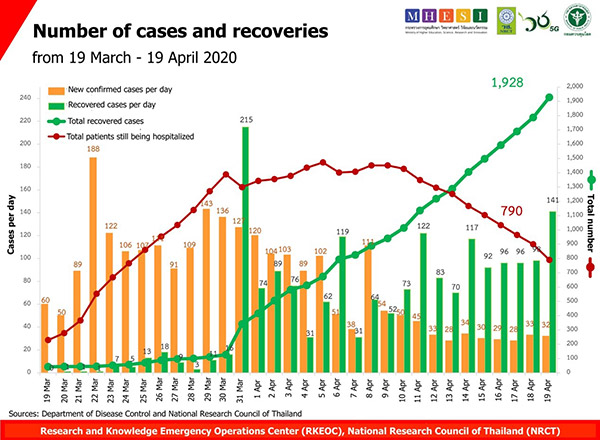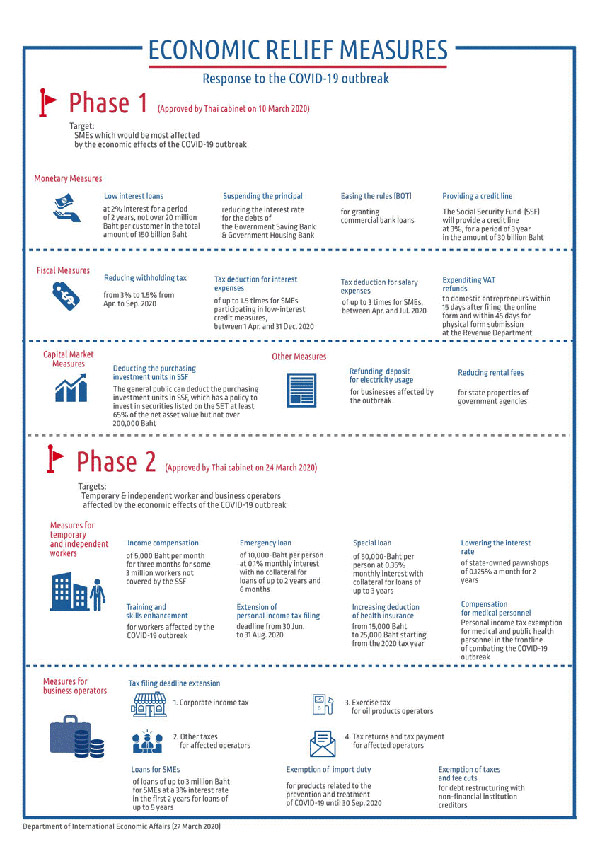The COVID-19 was declared a “dangerous communicable disease” under the Communicable Disease Act on 1 March and the following fourteen measures were announced:
1.Request every sector and organization to strictly comply with the Ministry of Public Health (MoPH) recommendations.
2.Closely follow up the situation and provide assistance to Thai people living in the affected countries.
3.Recommend every government sector to cancel or postpone plans to travel to affected countries and countries defined as risk areas as announced by the MoPH and based upon the surveillance method.
4.Arrange designated areas to observe and screen people who have suspected symptoms.
5.Government officers departing from affected areas shall implement self-quarantine for 14 days (the absence from work for this quarantine will not be considered official leave).
6.Prepare and stock necessary equipment. If it is necessary (in the case there is a lack of equipment), the relevant sectors can request additional budget.
7.Set up a data center to implement measures for solving any consequences caused by the COVID-2019 at the Government House of Thailand.
8.Have regular meetings to prepare for prevention.
9.All departments need to accelerate the procurement of any product used to meet the needs of preventing the disease.
10.Take care of health care workers appropriately.
11.The Ministry of Commerce is responsible for preventing stockpiling and for controlling prices of supplies.
12.The Ministry of Interior and the Ministry of Public Health are to jointly integrate and link data to comply with the Public Disaster Prevention and Mitigation Act, B.E. 2550.
13.The Ministry of Transport is to implement strict screening among users of transportation services and travelers.
14.Request cooperation from the public to refrain from attending mass gathering activities.
Social distancing practice - allowing at least 1 meter of space between people in society - has been introduced to the public in early March. Public buildings, public facilities and workplaces started to implement social distancing measures in their operations and services.
As businesses and services in Bangkok and big cities started to temporarily close due to the COVID-19 effect, there has been a rapid migration of people from Bangkok and big cities to their hometowns. To respond to this situation, the government has issued the following recommendations to all provinces:
1.Set volunteer teams to respond to COVID-19 at the district and village levels to implement active surveillance in those areas.
2.Create a database of travelers returning from Bangkok and its suburbs to their hometowns, with the beginning of the data collection starting on 2 March 2020 onwards
3.Provide knowledge and make returning travelers from Bangkok and its suburbs understand self-quarantine and observe fever and respiratory symptoms every day. Those travelers should avoid being close to other people in their residence until the completion of 14 days from the date of arrival in their residence.
The government has invoked the Emergency Decree across the nation, effective from 26 March to 30 April 2020. Directives corresponding to the Emergency Decree include:
● Temporary closure of all places designed for large public gatherings: 1) sports arena and children’s playground throughout the country; 2) service establishments, entertainment or health service facilities in Bangkok and the suburb.
● Border closure, with exemptions of deliverers of essential goods, travelers with a clearly defined mission and a definite timetable to leave the kingdom, diplomatic corps including family members with travel certificates, non-residents with work permits and Thai nationals. Except for the goods delivery, all travelers must carry a fit-to-fly certificate.
● Ban on stockpiling of commodities
● Ban on public gatherings
● Protection measures for high-risk groups, i.e. senior citizens, those with underlying health conditions and small children
● Mitigation strategies, e.g. regular cleaning of contact surfaces, wearing a face mask and social distancing. Tracing applications on a mobile phone may be used to track the movement of some people ordered into a 14-day quarantine or self-isolation.
● Stop or minimize any travel across provinces.
● Work from home is strongly encouraged.
Since the Emergency Decree enactment on 26 March, the current situation in Thailand is as follows:
● Temporary closure of all non-essential services except food delivery, supermarkets, food markets, drug stores, shops selling necessary items, and convenience stores.
● Major Airlines have temporarily suspended all domestic flights. The State Railway of Thailand has also suspended 44 train services including long-haul routes.
● In Bangkok, it is now compulsory to wear masks on public transport and at government offices.
● Implementing safe-distancing measures in workplaces, on public transport, and at essential service providers such as government offices.
● Daily updates on COVID-19 situation in the country by the DDC.
● All coronavirus patients will be treated for free at all hospitals in Thailand, with the costs paid by three healthcare funds, effective retroactively from March 5
● A nationwide curfew is imposed between 10pm and 4am from April 3 to April 30.
LESSONS LEARNED FROM THIS PANDEMIC
According to the Center for COVID-19 Situation Administration, the lessons learned on controlling the spread of COVID-19 can be summarized as follows:
Contact Tracing: must perform thorough tracing of people who come into contact with infected cases.
High Risk Contact: impose quarantine on high risk contact by ways of state quarantine and local quarantine.
Active Case Finding: should be applied in the areas where people worked closely with crowds and tourists and COVID-19 infections had been reported, such as Phuket.
Mass Screening: is not cost-effective if the disease has not spread widely.
CONCERNS OF THE GOVERNMENT AND THE PEOPLE
The COVID-19 outbreak has caused massive impacts to the economy and the effect has been felt far and wide by the society. Most businesses have suspended their operations, resulting in the sharp increase in unemployment. To address this problem, the government has rolled out a series of economic relief measures. Phase One of the series are largely aimed at small and medium-sized businesses which are most affected by the economic impacts of the outbreak. Phase Two focuses on mitigating the negative economic impacts on temporary and informal workers and business operators in the sectors most affected by the outbreak.
The Emergency Decree will end on 30 April. The government has yet to decide whether to extend the law or to loosen some measures. While people are eager to have their lives and businesses return to normalcy, reopening of businesses can result in the second wave of COVID-19.
SUGGESTIONS FOR COLLABORATION UNDER ANSO FRAMEWORK
There should be a platform for knowledge sharing on scientific data and discoveries related to COVID-19 from ANSO members which will be enormously beneficial to the advancement of medical research.
ROLES OF NSTDA IN THE COVID-19
NSTDA have collaborated with the Ministry of Public Health (MoPH) in responses and preparedness against emerging infectious diseases (EID) since 2004 when SARS first appeared and later against avian influenza, pandemic influenza 2009, MERS, Ebola, etc. The tasks of NSTDA include:
● Development of diagnostics, vaccines and drugs
● Mathematical modeling of diseases behaviors
● Studies on interactions between the pathogens and human at various levels
● Capacity building, construction and maintaining important facilities such as BSL3 lab, ABSL3 lab, pilot plants, genomics facility etc. NSTDA supports a number of laboratory networks that are specialized in emerging pathogens, making sure that once pandemics occur the national capacity would be available.
● Knowledge management
In addition, NSTDA has involved in policy bodies including the National Committee for EID Preparedness, the National Vaccine Committee and Thailand Partnership in Emerging Infectious Research.
On COVID-19, NSTDA has contributed its scientific knowledge in various aspects. The agency, in collaboration with several institutes, has modeled the spread of COVID-19 with weekly update, serving as information for policy decision of MoPH. NSTDA has provided research support to 12 projects in the following areas:
● Mathematical modelling
● Diagnostic Development, e.g. LAMP, cheap RNA extraction method from local materials, neutralizing antibody assay, and validation of rapid antibody assay
● Surveillance of SARS CoV2 in various setting
● Genomic sequencing of SARS CoV2
● Preparing antiserum for therapy
● Vaccine candidate constructions
NSTDA research teams have successfully developed innovations and solutions for COVID-19 which include:
● Germ Saber Robot: a UV sterilization robot
● Softwares: DDC care (a mobile app for DDC to track and monitor health of individuals at risk of COVID-19) and Traffy Fondue Application (an app that enables citizens to report on people coming into the province from COVID-19 affected areas and alerts local authorities to investigate and conduct proper health screening & monitoring on the reported case.)
● Ventilators
● AI for diagnosis of chest radiograph
Through its broad network, NSTDA was able to assist industry in finding materials to supply surgical masks and help hospitals to acquire PPE and N95 supplies.
On the international front, NSTDA and the Chinese Academy of Sciences (CAS) held the first online meeting on 30 March 2020 to discuss COVID-19 situation and collaboration. The first meeting focuses on the experiences of Chinese physicians and researchers on clinical information of treatments - tocilizumab, chloroquine and convalescence plasma, diagnostics and immunological studies. The meeting was participated by faculty members and physicians from the University of Science and Technology of China (USTC), the first affiliated hospital of USTC, Faculty of Medicine Siriraj Hospital, Mahidol University and NSTDA. The second meeting will focus on “Clinical experience from China in taking care of the COVID-19 patients as well as the treatment” and is expected to reach a wider audience of Thai physicians and medical researchers.


